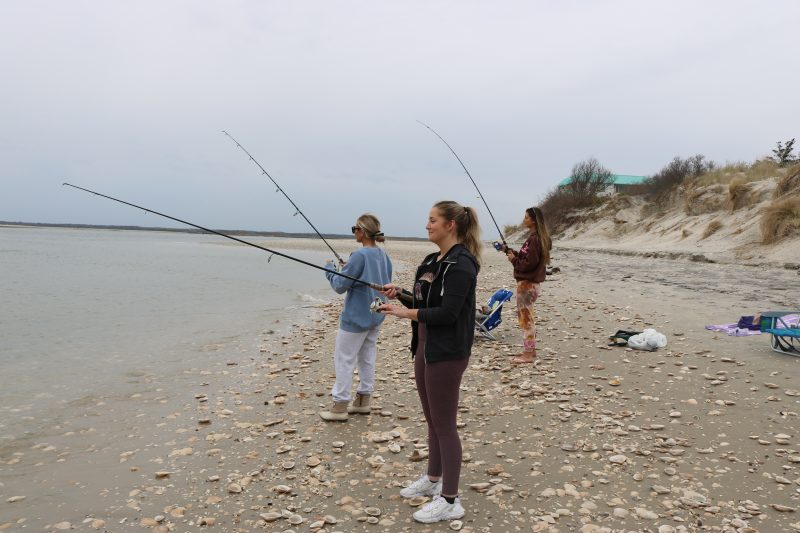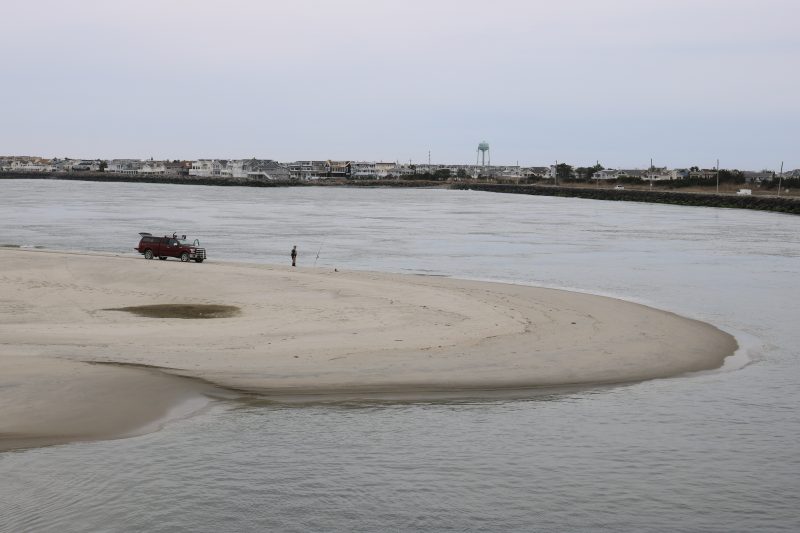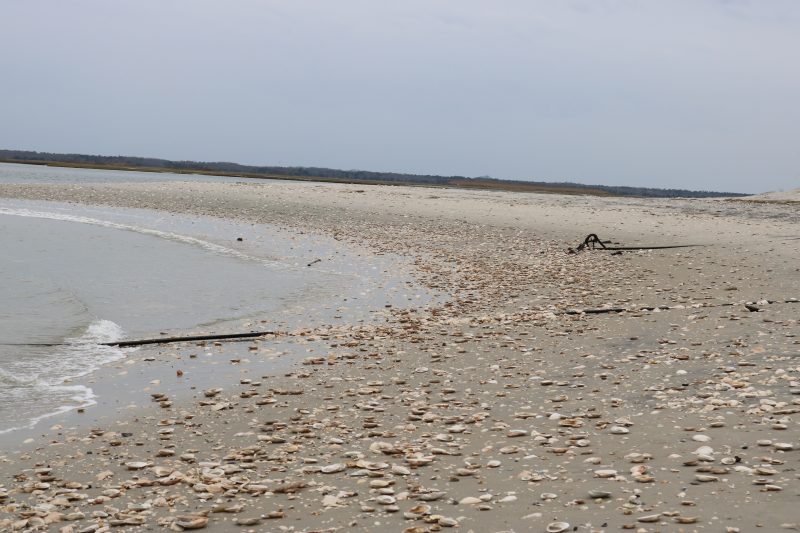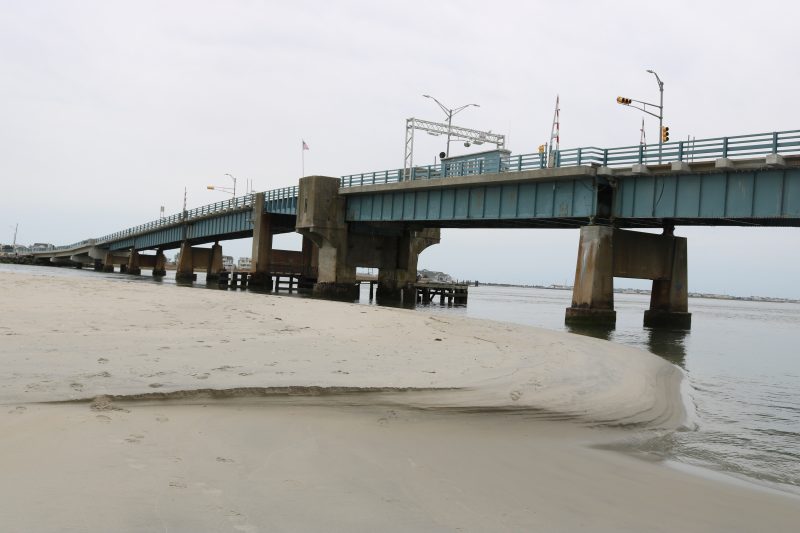The shoreline is now littered with countless clam shells in place of the thick sand once there.
 By DONALD WITTKOWSKI
By DONALD WITTKOWSKI
Erin McAleer, Jordan Markulics and Nicolette Schwartz, three friends from Gloucester County, were casting their fishing lines into the waters of Townsends Inlet while standing on a beach that no longer had any powdery sand.
As they moved around, there was a curious crunching sound underneath their feet. They were standing on clam shells – literally thousands upon thousands of clam shells.
“I said, ‘Oh, my God, they’re full clam shells,’” Schwartz said of her reaction when they first arrived at Townsends Inlet to fish. “They’re not even cracked, either. They look brand new.”
Much of the top layer of thick sand that once covered the beach on the Sea Isle City side of the Townsends Inlet Bridge appears to have been swept away into the channel, exposing all of the shells.
The remnants of the beach, in turn, have formed a gigantic sandbar that extends far into Townsends Inlet. Beachgoers can now walk out nearly as far as the middle of the bridge, where the swift waters of the inlet usually flow.

A newly created sandbar juts out into the channel.
Although the sandbar juts out into the inlet like a makeshift peninsula, it does not present a danger for boat traffic passing underneath the bridge.
“Our bridge channel is navigable,” said Lewis Donofrio, chief engineer for the Cape May County Bridge Commission, the agency that operates the Townsends Inlet Bridge.
Donofrio speculated that the deep and swift waters of Townsends Inlet caused the dramatic reshaping of the beach next to the bridge – much like a whirlpool effect.
“Through winter and summer, there are dramatic changes to Sea Isle’s beach line,” he said Thursday.

The shoreline is now littered with countless clam shells in place of the powdery top layer of sand once there.
Donofrio explained that the beach's transformation is a natural process where “the sand goes away and comes back.”
“We do see a lot of change there,” Donofrio said.
Much of the sand that covered the beach next to the bridge on the Sea Isle side has been stripped away. Piles of clam shells stretch far down the shoreline in place of the sand.
Formerly, beachgoers could walk underneath the bridge’s concrete support piers, but that area has now been filled in with water displaced from the channel by the massive sandbar.
Townsends Inlet separates Sea Isle and Avalon. The bridge was built in 1939 to connect both communities. The inlet acts as a superhighway of sorts to link the back bays of Sea Isle and Avalon with the ocean.

The sandbar allows beachgoers to walk out close to the middle of the bridge.
This is not the first time that the beach on the Sea Isle side has been radically altered by Townsends Inlet. Last summer, a large section of the beach south of 94th Street collapsed like a mini avalanche and was gobbled up by the water.
The phenomenon was captured on video that went viral after it was posted on YouTube, Facebook and other social media platforms.
Just like now with Sea Isle’s newly formed sandbar, the collapsed beach last summer was blamed on the inlet’s powerful and rapidly flowing waters.
Last summer, Sea Isle’s beaches were widened and replenished with more than 750,000 cubic yards of new sand between 28th and 52nd streets in the midsection of town and from 74th to 93rd streets in Townsends Inlet at the southern tip of the island.
It is not clear whether the beach replenishment project may have had any role in the creation of the new sandbar.
https://www.youtube.com/watch?v=WzpdKOJ8jA4
 By DONALD WITTKOWSKI
Erin McAleer, Jordan Markulics and Nicolette Schwartz, three friends from Gloucester County, were casting their fishing lines into the waters of Townsends Inlet while standing on a beach that no longer had any powdery sand.
As they moved around, there was a curious crunching sound underneath their feet. They were standing on clam shells – literally thousands upon thousands of clam shells.
“I said, ‘Oh, my God, they’re full clam shells,’” Schwartz said of her reaction when they first arrived at Townsends Inlet to fish. “They’re not even cracked, either. They look brand new.”
Much of the top layer of thick sand that once covered the beach on the Sea Isle City side of the Townsends Inlet Bridge appears to have been swept away into the channel, exposing all of the shells.
The remnants of the beach, in turn, have formed a gigantic sandbar that extends far into Townsends Inlet. Beachgoers can now walk out nearly as far as the middle of the bridge, where the swift waters of the inlet usually flow.
By DONALD WITTKOWSKI
Erin McAleer, Jordan Markulics and Nicolette Schwartz, three friends from Gloucester County, were casting their fishing lines into the waters of Townsends Inlet while standing on a beach that no longer had any powdery sand.
As they moved around, there was a curious crunching sound underneath their feet. They were standing on clam shells – literally thousands upon thousands of clam shells.
“I said, ‘Oh, my God, they’re full clam shells,’” Schwartz said of her reaction when they first arrived at Townsends Inlet to fish. “They’re not even cracked, either. They look brand new.”
Much of the top layer of thick sand that once covered the beach on the Sea Isle City side of the Townsends Inlet Bridge appears to have been swept away into the channel, exposing all of the shells.
The remnants of the beach, in turn, have formed a gigantic sandbar that extends far into Townsends Inlet. Beachgoers can now walk out nearly as far as the middle of the bridge, where the swift waters of the inlet usually flow.

 The shoreline is now littered with countless clam shells in place of the powdery top layer of sand once there.
Donofrio explained that the beach's transformation is a natural process where “the sand goes away and comes back.”
“We do see a lot of change there,” Donofrio said.
Much of the sand that covered the beach next to the bridge on the Sea Isle side has been stripped away. Piles of clam shells stretch far down the shoreline in place of the sand.
Formerly, beachgoers could walk underneath the bridge’s concrete support piers, but that area has now been filled in with water displaced from the channel by the massive sandbar.
Townsends Inlet separates Sea Isle and Avalon. The bridge was built in 1939 to connect both communities. The inlet acts as a superhighway of sorts to link the back bays of Sea Isle and Avalon with the ocean.
The shoreline is now littered with countless clam shells in place of the powdery top layer of sand once there.
Donofrio explained that the beach's transformation is a natural process where “the sand goes away and comes back.”
“We do see a lot of change there,” Donofrio said.
Much of the sand that covered the beach next to the bridge on the Sea Isle side has been stripped away. Piles of clam shells stretch far down the shoreline in place of the sand.
Formerly, beachgoers could walk underneath the bridge’s concrete support piers, but that area has now been filled in with water displaced from the channel by the massive sandbar.
Townsends Inlet separates Sea Isle and Avalon. The bridge was built in 1939 to connect both communities. The inlet acts as a superhighway of sorts to link the back bays of Sea Isle and Avalon with the ocean.
 The sandbar allows beachgoers to walk out close to the middle of the bridge.
This is not the first time that the beach on the Sea Isle side has been radically altered by Townsends Inlet. Last summer, a large section of the beach south of 94th Street collapsed like a mini avalanche and was gobbled up by the water.
The phenomenon was captured on video that went viral after it was posted on YouTube, Facebook and other social media platforms.
Just like now with Sea Isle’s newly formed sandbar, the collapsed beach last summer was blamed on the inlet’s powerful and rapidly flowing waters.
Last summer, Sea Isle’s beaches were widened and replenished with more than 750,000 cubic yards of new sand between 28th and 52nd streets in the midsection of town and from 74th to 93rd streets in Townsends Inlet at the southern tip of the island.
It is not clear whether the beach replenishment project may have had any role in the creation of the new sandbar.
https://www.youtube.com/watch?v=WzpdKOJ8jA4
The sandbar allows beachgoers to walk out close to the middle of the bridge.
This is not the first time that the beach on the Sea Isle side has been radically altered by Townsends Inlet. Last summer, a large section of the beach south of 94th Street collapsed like a mini avalanche and was gobbled up by the water.
The phenomenon was captured on video that went viral after it was posted on YouTube, Facebook and other social media platforms.
Just like now with Sea Isle’s newly formed sandbar, the collapsed beach last summer was blamed on the inlet’s powerful and rapidly flowing waters.
Last summer, Sea Isle’s beaches were widened and replenished with more than 750,000 cubic yards of new sand between 28th and 52nd streets in the midsection of town and from 74th to 93rd streets in Townsends Inlet at the southern tip of the island.
It is not clear whether the beach replenishment project may have had any role in the creation of the new sandbar.
https://www.youtube.com/watch?v=WzpdKOJ8jA4